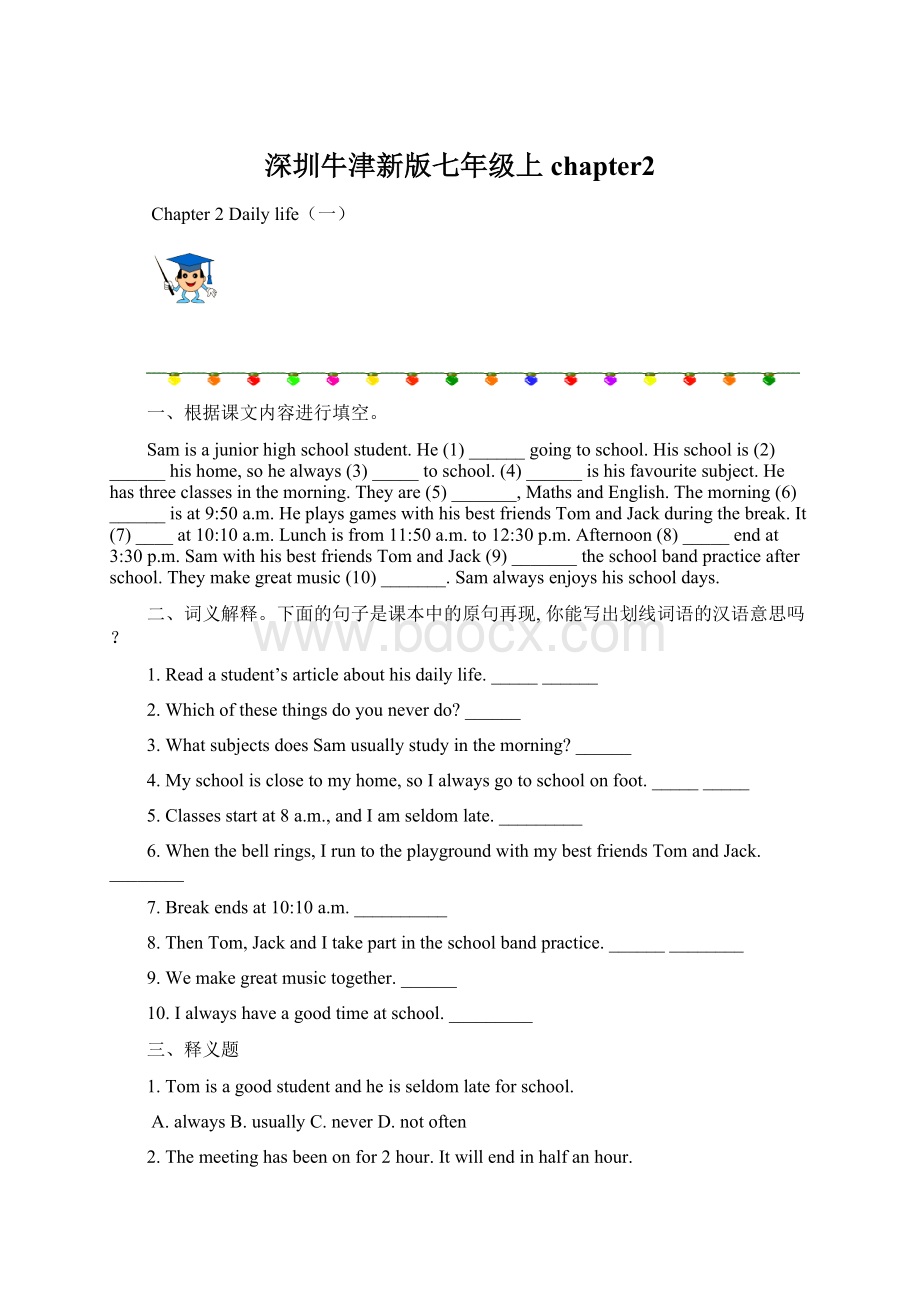深圳牛津新版七年级上chapter2.docx
《深圳牛津新版七年级上chapter2.docx》由会员分享,可在线阅读,更多相关《深圳牛津新版七年级上chapter2.docx(25页珍藏版)》请在冰豆网上搜索。

深圳牛津新版七年级上chapter2
Chapter2Dailylife
(一)
一、根据课文内容进行填空。
Samisajuniorhighschoolstudent.He
(1)______goingtoschool.Hisschoolis
(2)______hishome,sohealways(3)_____toschool.(4)______ishisfavouritesubject.Hehasthreeclassesinthemorning.Theyare(5)_______,MathsandEnglish.Themorning(6)______isat9:
50a.m.HeplaysgameswithhisbestfriendsTomandJackduringthebreak.It(7)____at10:
10a.m.Lunchisfrom11:
50a.m.to12:
30p.m.Afternoon(8)_____endat3:
30p.m.SamwithhisbestfriendsTomandJack(9)_______theschoolbandpracticeafterschool.Theymakegreatmusic(10)_______.Samalwaysenjoyshisschooldays.
二、词义解释。
下面的句子是课本中的原句再现,你能写出划线词语的汉语意思吗?
1.Readastudent’sarticleabouthisdailylife.___________
2.Whichofthesethingsdoyouneverdo?
______
3.WhatsubjectsdoesSamusuallystudyinthemorning?
______
4.Myschoolisclosetomyhome,soIalwaysgotoschoolonfoot.__________
5.Classesstartat8a.m.,andIamseldomlate._________
6.Whenthebellrings,IruntotheplaygroundwithmybestfriendsTomandJack.________
7.Breakendsat10:
10a.m.__________
8.ThenTom,JackandItakepartintheschoolbandpractice.______________
9.Wemakegreatmusictogether.______
10.Ialwayshaveagoodtimeatschool._________
三、释义题
1.Tomisagoodstudentandheisseldomlateforschool.
A.alwaysB.usuallyC.neverD.notoften
2.Themeetinghasbeenonfor2hour.Itwillendinhalfanhour.
A.startB.overC.stopD.begin
3.Sam’sbirthdaypartywasreallygreat.Hehasagoodtimelastnight.
A.enjoyedhimselfB.wassadC.wasangryD.wasbusy
4.Ourschoolwillhaveasportsmeetingnextmonthandmanystudentswilltakepartinit.
A.joinB.joininC.lookforD.havealookat
5.Duringthemorningbreak,Ialwaysplaygameswithmyfriends.
A.studytimeB.eatingtimeC.resttimeD.readingtime
6.Myfather’sofficeisnearmyhome.Heoftengoestoworkonfoot.
A.runsB.walksC.ridesD.drives
7.Yourfathercalledyouupanhourago..
A.clearupB.makeupC.getupD.ringup
四、根据单词首字母,完成整个句子。
1.Thatwaswrong.I’llndoitagain.
2.Iugotoschoolbybus.
3.Maryisagoodstudent.Sheisslateforschool.
4.Bobby,JackandJohnaregoodfriends.Theyoftengotothebeacht
insummer.
5.OnSundaymorning,mymumusuallygoestotheflowerm.
6.TomandMikearethesameage.Theyareinthesameg.
7.Whenthebrang,Iwenttoopenthedoor.
8.Youareverytired,youshouldhaveab.
9.Ilovemusicverymuch.Iespeciallylikeplayingtheg.
10.Theshowwilleatfour.
1.Inthisunit,youwilllearnaboutpeople’sdailylives.
daily形容词,译为“每日的,日常的”,daily=everyday。
比如:
everydayEnglish=dailyEnglish日常英语
2.Listentoaboytalkingabouthisweekend.
talkabout译为“谈论”let’stalkaboutourhobbies.
talkto\withsb.译为“与某人交谈”
Mymotheristalkingwithherfriend.
3.Iamajuniorhighschoolstudent.
ajuniorhighschoolstudent初中生
aseniorhighschoolstudent高中生
aprimaryschoolstudent小学生
4.Whichofthesethingsdoyoudoonceortwiceaweek?
次数的表达:
表示“一次”用once,表示“两次”用twice,表示“三次或三次以上”用基数词+times,此时,time是可数名词,译为“次数”。
5.Myschoolisclosetomyhome,soIalwaysgotoschoolonfoot.
so意为“因此,所以”。
在连接表示原因和结果的两个句子时,so后面的句子表示结果,与前面表示原因的句子往往用逗号分开。
【拓展】表示原因的句子可以用because来引导,但so和because不能同时出现在句子里。
例如:
BecauseIwastired(疲劳的),Iwenttobedearlylastnight.
onfoot译为“步行”,gotosponfoot=walktosp
翻译:
我每天走路去学校。
=
【拓展】使用交通工具的不同表达方式
a.动词表达法。
如walk(步行),ride(骑),take(乘)等。
例如:
Iridemybiketoschooleveryday.我每天骑自行车上学。
Heseldomtakesabustothecity.他很少乘公共汽车去城里。
b.by+交通工具(交通工具前不加任何限定词)例如:
Igotoschoolbybikeeveryday.我每天骑自行车上学。
c.介词表达法:
用介词in/on+a/an/物主代词+交通工具。
Dalegoestoworkinhiscar.戴尔开车去上班。
6.Classesstartsat8o’clock,andIseldomlate.
start=begin“开始”,反义词:
end=finish,“结束”
at+具体时刻,at6:
00p.m.at+小地点atthehotel,atschool,athome.
seldom属于频度副词,意为“很少;不常”,常放在行为动词前面,或be动词后面
翻译:
Iseldomgotobedlate.(译文:
___________________)
布莱恩很少穿新衣服。
Brain____________newclothes.
频率副词:
always(总是),usually(通常),often(经常),sometimes(有时),seldom
(很少)never(从不)
7.Ienjoylearningaboutdifferentplacesintheworld.
enjoy\like\love+doingsth
learnabout“学习,了解”
different形容词,译为“不同的”。
different+可数名词复数。
常见的短语结构:
bedifferentfrom译为“与...不同”
8.“Whenthebellrings,IruntotheplaygroundwithmybestfriendsTom
andJack.”
when在这里不是作疑问副词,而是作连词,引起状语从句,意为“当……时”。
Youcanaskhimwhenhecomesback.当他回来的时候,你可以问他。
9.Howshortitis!
本句是一个由how引导的感叹句,其结构为:
How+adj\adv+主语+谓语!
Howbeautifulourschoolis!
Howfastheruns!
10.Lunchisfrom11:
50a.m.to12:
30p.m.
from...to...“从...到...”
11.ThenTom,JackandItakepartintheschoolbandpractice.
takepartin意为“参与……;参加……活动,工作,游戏,会议”。
翻译:
Johntakespartinallkindsofschoolactivities.
(译文:
___________________________)
【拓展】join与takepartin的用法辨析
这两个词语都可表示“参加”,但它们的含义却有所不同。
a.join意为“加入”,指加入组织或团体,成为其中一员。
Ihopetojointhefootballteam.我希望加入足球队。
b.takepartin表示“参加”,即参与某项活动,并在其中起积极作用。
例如:
Everyonecantakepartinthesportsmeeting.每个人都可参加运动会。
练习:
请根据句意选用takepartin或join完成句子。
a.Marylikesto_____theschoolpianoclub.
b.Sheseldom____________theclassactivities.
1、单项选择
()1.Therewerenotanybusesthen,______wehadtowalkhome.
A.becauseB.andC.soD.But
()2.It’stoofar,it’simpossibleforyoutogothere.
A.onfootB.bybusC.bytrainD.byair
()3.I’m14yearsold,andIstudyin.
A.juniorhighschoolB.highschool
C.primaryschoolD.noschool
()4.I’mlearningto___ahorse.
A.takeB.byC.inD.ride
()5.Lunchisfrom11:
5012:
30.
A.ofB.toC.inD.on
()6.Youhaveworkedforalongtime.Youreallyneedto.
A.goawayB.havesomerestsC.havearestD.haverests
()7.Lookatthatboy!
heis.
A.whattallB.HowtallC.whatatallD.Howatall
()8.Samlovesontheplaygroundwithhisclassmatesatbreak.
A.runsB.runningtoC.runningD.torun
()9.Atweekends,myfatherloves____hillsbutmymotherlikes_____athome.
A.climb,stayB.climbing,stayingC.climb,stayingD.climbing,stay
()10.Wewillselectanewmayorallthecandidates.
A.betweenB.amongC.underD.over
()11.Weareallverytired,wewanttohavebreaknow.
A.aB.anC.theD./
()12.Myfatheralwaysgoestobed_____10p.m.
A.onB.inC.forD.at
()13.--Mary,wouldyouliketothisgame?
--I‘dloveto,Ihavetofinishmyhomeworkfirst.
A.play,soB.join,butC.playwithD.takepartin,but
()14.—IsyourEnglishteacherfriendly?
—Yes.She’s_____mad(生气的)atus.
A.alwaysB.usuallyC.oftenD.never
()15.Ourafternoonclasses_____at3:
30p.m.
A.beginB.openC.finishD.end
1.dailylife2.talkabout
3.brushmyteeth4.watchtelevision(TV)
5.Playtabletennis6.rideabicycle
7.juniorhighschool8.步行
9.学习,了解10.参加
11.过得愉快12.
13.和...一起玩14.在世界上
15.从...到...
Chapter2Dailylife
(二)
一般现在时的概念及用法:
(一)目标展示。
朗读并翻译下列句子。
1.Shealwayswalkstoschool.
2.Sheknowssevenlanguages.
3.Thesunrisesintheeast.
(二)知识归纳。
以上句子都运用了一般现在时。
通过例句我们可以发现一般现在时表示(填写部分从下面几项中选择:
目前;经常性,习惯性;客观事实,普遍真理)
1._______,_______的动作,如TaskI中的例句1。
2._____的状态或情况,如TaskI中的例句2。
3._________,________,如TaskI中的例句3。
(三)基础学习。
小资料:
一般现在时各种句型及动词变化规则
◆一般现在时各种句型:
句型
主语
谓语动词
肯定
陈述句
I / You / We / They
work.
She / He / It
works.
否定
陈述句
I / You / We / They
don’t work.
She / He / It
doesn’t work.
一般
疑问句
Do I / you / we / they
work?
Does she / he / it
work?
◆一般现在时的动词变化规则:
1.系动词be的一般现在时有am,is,are三种形式,
其否定形式分别为amnot/’mnot,isnot/isn’t,arenot/aren’t。
am与I连用,is与she,he,it等代词及表示单数概念的名词连用,are与you,we,they
等代词及表示复数概念的名词连用。
2.实义动词的一般现在时有两种:
(1)动词原形通常和I,you,we,they等代词及表示_____(单数/复数)概念的名词连用,
其否定式为donot/don’t+动词原形。
(2)______________________通常和she,he,it等代词及表示单数概念的名词连用,
其否定式为doesnot/doesn’t+动词原形。
频率副词的使用:
(一)目标展示。
完成并朗读下列句子。
1.Maryis______(一直;总是)ahelpfulgirl.
2.I____________(通常/经常)playthepianointheevening.
3.TheBrowns_________(偶尔)gotothemoviesatweekends.
4.Heis______(很少)lateforschool.
5.Hecan_____(从不)understand.
(二)知识归纳。
1.频度副词排序:
频度副词表示动作发生的频率,即频繁程度。
以上例句中所填单词均为频度副词,它们按
频率的高低可排列如下:
always>_______>often>_________>seldom>_______
2.表示频度的短语的构成:
a.一种是“次数+a+时间范围”。
例如:
once/twiceaday/week/month/year。
若次数是三次或三次以上时用“基数词+times+a+时间范围”。
例如:
three/four/five...timesaday/week/month/year。
b.另一种是every+表示时间的名词(如day,week,month,year等)。
这两种频度短语都可用于回答以_________提问的问句。
3.频度副词或短语的位置:
频度副词通常放在________和________的后面,_________的前面。
例如:
Shealwaysgetstoschoolontime.
Sheisneverlateforschool.
Shecanalwaysremembereverythingclearly.
频度短语通常放在句子的开头或结尾。
例如:
Twiceamonth,Igohiking.=Igohikingtwiceamonth.
一、选择填空。
()1.Amy______hamburgersforbreakfast.Sheoftenhasnoodles.
A.doesn’teatB.don’teatC.isn’teatD.noteat
()2.TomandKate______theworkertocleanthegardenonceaweek.
A.helpsB.helpC.ishelpingD.arehelping
()3.LiJieisgoodatEnglish.Hecan______Englishwell.
A.speaksB.speakingC.speakD.doesn’tspeak
()4.DoesZhenHui______herteethand______herfaceat7:
00a.m.?
A.brushes;washesB.brushes;wash
C.brush;washesD.brush;wash
()5.Idon’tlikefootballatall.I______playit.
A.sometimesB.oftenC.neverD.always
()6.MyfatheroftengoesrunninginthemorningbutI______dothat.
A.oftenB.usuallyC.alwaysD.Seldom
()7.—______doyouplaytheguitar?
—Three______aweek.
A.Howoften;t